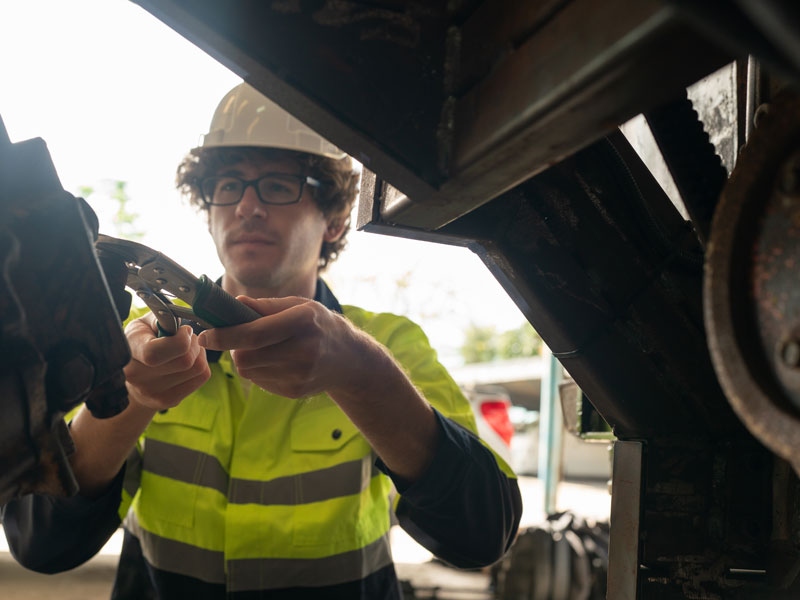
As a general contractor in Texas, you need to be strict about verifying trucking company rules and regulations when assessing and subcontracting to haulers. You can’t afford to run into legal issues. They’re not only expensive but can delay or derail your project.
So in this article, we’re going to run through
- some of the main essential trucking company rules and regulations that apply in Texas,
- where federal and state regulations differ, and
- what recent updates might affect your operations.
Federal vs. State Trucking Company Rules and Regulations: What Applies in Texas?
Trucking companies that haul construction materials, heavy equipment, and demolition debris in Texas may have to comply with both federal and state regulations.
The Federal Motor Carrier Safety Administration (FMCSA) enforces nationwide trucking laws, while the Texas Department of Motor Vehicles (TxDMV) and the Texas Department of Public Safety (DPS) set additional state requirements.
You always need to bear in mind how these regulations affect hauling services for your projects: Compliance failures can lead to legal liability.
At the federal level, FMCSA regulations apply to interstate hauling. Any truck crossing state lines must follow:
- Commercial Driver’s License (CDL) requirements
- Hours of Service (HOS) limits to prevent driver fatigue
- Drug and alcohol testing policies
- Weight restrictions for loaded trucks
However, Texas-specific regulations apply to trucks that operate entirely within state borders.
One key difference is that Texas allows drivers under 21 to operate commercial vehicles within state lines. But federal law requires interstate drivers to be 21 or older. So – if you’re hiring trucking companies for in-state hauling, be aware that some drivers may be under 21. Make sure they have the right experience for your project!
Weight and load limits are part of Texas trucking company rules and regulations. For example, Texas issues oversize/overweight permits through the TxDMV if you’re hauling heavy materials like concrete, steel, and oversized equipment.
In addition, construction hauling often requires route-specific permits due to the size and weight of materials being transported. Always confirm that your trucking partners secure the correct permits before hauling heavy loads to your site.
You’ll also have noticed that Texas DPS Commercial Vehicle Enforcement (CVE) officers conduct roadside inspections to ensure compliance with safety laws!
This includes
- checking tie-downs for equipment,
- inspecting dump trucks for proper load covering, and
- enforcing weight limits on highways and bridges.
If your trucking company doesn’t follow these rules, you could face unexpected delays, penalties, or legal responsibility in the event of an accident. Only work with trucking companies that understand both FMCSA and Texas regulations for construction hauling!
Key Trucking Company Rules and Regulations Intrastate
In Texas, all commercial motor vehicles are required to register with both the Texas Department of Transportation (TxDOT) and the FMCSA. This registration ensures compliance with state and federal laws governing transportation.
We mentioned oversize loads above. Texas enforces a maximum gross vehicle weight of 80,000 pounds, with specific axle weight limits to protect roadways and bridges. When exceeding the limit, trucking companies must secure appropriate permits.
Regular vehicle inspections and maintenance are mandated to ensure that all commercial vehicles meet safety standards, thereby reducing the risk of accidents and associated liabilities.
Driver qualifications are another critical aspect. Operators must have held a valid Commercial Driver’s License (CDL) for at least 14 days and a clean driving license – as well as comply with drug and alcohol testing regulations.
Texas enforces specific Hours of Service rules, limiting drivers to a maximum of 12 hours of driving following eight consecutive hours off duty, and prohibiting driving after being on duty for 15 hours. These measures aim to prevent fatigue-related incidents and ensure timely project completion.
Insurance requirements are stringent. Your trucking company must have and maintain liability insurance for each registered vehicle.
Recent Updates to Texas Trucking Rules and Regulations
Recent legislative changes in Texas impact how trucking companies operate within the construction and demolition industries.
One key update is the continued requirement for commercial vehicle safety inspections – despite this being eliminated for non-commercial vehicles starting in 2025.
Additionally, enforcement trends related to weight limits and oversized load permitting have become stricter. Expect more scrutiny on permits and load compliance!
Cowboy Trucking Complies with All Trucking Company Rules and Regulations
It’s essential to the success of your project to ensure your trucking partner complies with both federal and state laws so you can focus on getting the job done. Which is what we at Cowboy trucking do – we get the job done.
We’re a reliable, well-known family business in Texas, renowned for our attention to communication and coping with whatever is thrown at us. Let’s talk today!
